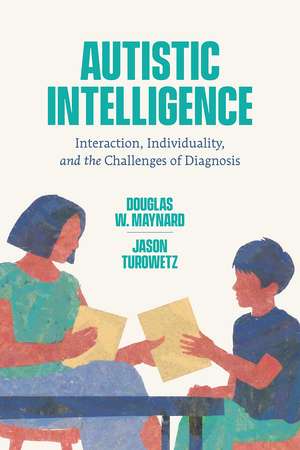Autistic Intelligence: Interaction, Individuality, and the Challenges of Diagnosis
Autor Douglas W. Maynard, Jason Turowetzen Limba Engleză Paperback – 25 mai 2022
As autism has become a widely prevalent diagnosis, we have grown increasingly desperate to understand it. Whether by placing baseless blame on vaccinations or seeking a genetic cause, Americans have struggled to understand what autism is and where it comes from. In Autistic Intelligence, Douglas W. Maynard and Jason Turowetz focus on a different origin of autism: the diagnostic process. By looking at how autism is diagnosed, they ask us to question the norms we use to measure autistic behavior against, why we understand autistic behavior as disordered, and how we go about assigning that disorder to particular people.
To do so, the authors take a close look at a clinic in which children are assessed for and diagnosed with autism. Their research draws on hours observing assessment evaluations among psychologists, pediatricians, parents, and children in order to make plain the systems, language, and categories that clinicians rely upon when making their assessments. Those diagnostic tools determine the kind of information doctors can gather about children, and indeed, those assessments affect how children act. Autistic Intelligence shows that autism is not a stable category, but the result of an interpretive act, and in the process of diagnosing children with autism, we often miss all of the unique contributions they make to the world around them.
| Toate formatele și edițiile | Preț | Express |
|---|---|---|
| Paperback (1) | 212.39 lei 6-8 săpt. | |
| University of Chicago Press – 25 mai 2022 | 212.39 lei 6-8 săpt. | |
| Hardback (1) | 691.60 lei 6-8 săpt. | |
| University of Chicago Press – 6 iun 2022 | 691.60 lei 6-8 săpt. |
Preț: 212.39 lei
Preț vechi: 223.58 lei
-5% Nou
40.64€ • 42.57$ • 33.68£
Carte tipărită la comandă
Livrare economică 08-22 aprilie
Specificații
ISBN-10: 0226816001
Pagini: 288
Ilustrații: 22 halftones, 1 line drawings, 1 tables
Dimensiuni: 152 x 229 x 20 mm
Greutate: 0.31 kg
Editura: University of Chicago Press
Colecția University of Chicago Press
Notă biografică
Douglas W. Maynard is the Maureen T. Hallinan Professor of Sociology, emeritus at the University of Wisconsin–Madison. He is author or editor of numerous books, including Bad News, Good News: Conversational Order in Everyday Talk and Clinical Settings, also published by the University of Chicago Press. Jason Turowetz is postdoctoral research fellow at the the University of Siegen's Center for Media of Cooperation with an appointment at the Garfinkel archive in Newburyport, MA. He is the author of over thirty academic articles and co-author of Morality in the Making: Stanley Milgram’s ‘Obedience’ Experiments and the New Science of Morality (forthcoming from Oxford University Press).
Cuprins
Chapter 1: Common Sense and the Interaction Order of the Clinic
Chapter 2: A Brief History and Biology of Autism Diagnosis: Why We Need an Interactional Approach
Chapter 3: An Interactional Entrance to Autism Diagnosis
Chapter 4: Autistic Intelligence as Uncommon Sense
Chapter 5: Varieties of Autistic Intelligence
Chapter 6: Doing Diagnosis: Narrative Structure
Chapter 7: Is Autism Real?
Chapter 8: Interaction and the Particular Autistic Person
Acknowledgments
Notes
References
Index
Recenzii
our time. The book shifts attention from the internal processes that predominate in public representations of autism to the space between autistic people and the contexts that constitute their life worlds."
Descriere
Examines the diagnostic process to question how we understand autism as a category and to better recognize its intelligence and uncommon sense.
As autism has become a widely prevalent diagnosis, we have grown increasingly desperate to understand it. Whether by placing baseless blame on vaccinations or seeking a genetic cause, Americans have struggled to understand what autism is and where it comes from. In Autistic Intelligence, Douglas W. Maynard and Jason Turowetz focus on a different origin of autism: the diagnostic process. By looking at how autism is diagnosed, they ask us to question the norms we use to measure autistic behavior against, why we understand autistic behavior as disordered, and how we go about assigning that disorder to particular people.
To do so, the authors take a close look at a clinic in which children are assessed for and diagnosed with autism. Their research draws on hours observing assessment evaluations among psychologists, pediatricians, parents, and children in order to make plain the systems, language, and categories that clinicians rely upon when making their assessments. Those diagnostic tools determine the kind of information doctors can gather about children, and indeed, those assessments affect how children act. Autistic Intelligence shows that autism is not a stable category, but the result of an interpretive act, and in the process of diagnosing children with autism, we often miss all of the unique contributions they make to the world around them.
